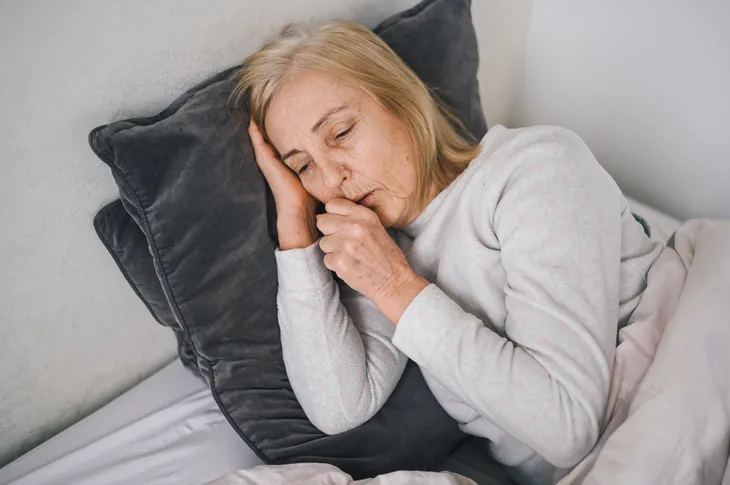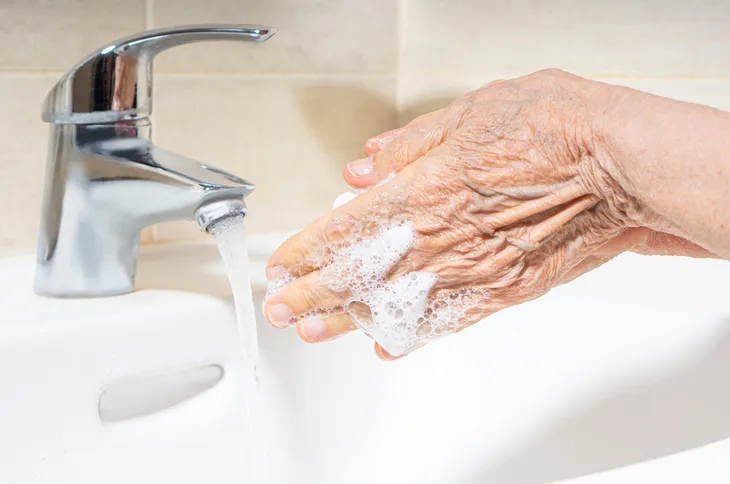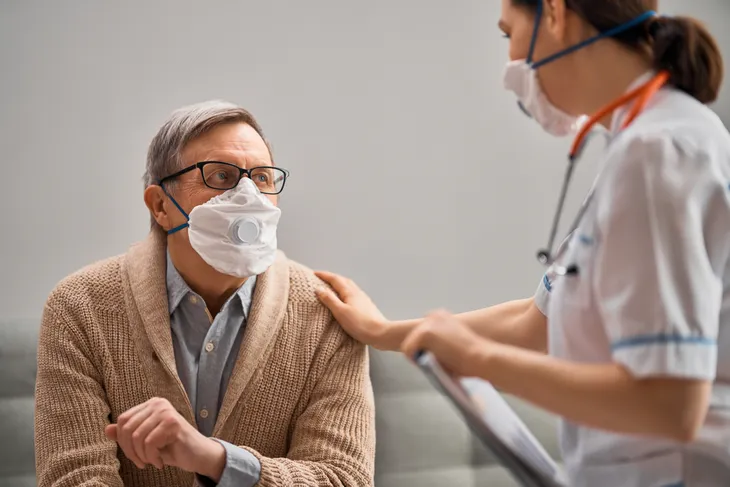When the weather becomes cool and the leaves start to change, we begin to change into jackets and mittens. But we should also change our habits surrounding infectious respiratory diseases, such as influenza. Influenza, commonly called the flu, circulates more rapidly in the colder months and is especially hard on seniors. This is illustrated by the CDC’s statistic that “…between 70-percent and 85-percent of seasonal flu-related deaths have occurred in people 65 years and older…”
Anyone who is over 65-years-old or knows someone who is over 65 should learn as much as they can about the flu to protect themselves and the ones they love. In this article, we’ll talk about flu symptoms, causes, treatments, and the best ways to prevent catching it in the first place.
Want senior content delivered straight to your inbox? Sign up for our exclusive email list and receive articles and news on diet & nutrition, fitness, and mental health dedicated specifically to our senior audience!
Symptoms: Fever, Chills, Cough, & More
Influenza causes fever, chills, body aches, headaches, and many times a cough. Its symptoms come on fast and furious. Many people who have had the flu describe it as getting hit by a bus. Seniors have weaker immune systems than adults, making it more likely that their symptoms will be more pronounced.
A cold can easily be confused with the flu. The major differences between the two are that a cold’s onset is gradual. Also, the symptoms of a cold are less severe. Those suffering from a cold are more likely to have a runny nose than those with the flu.
Symptoms: Complications
Seniors are at a particularly high risk of developing complications related to the flu. With their immune system unable to fight the infection as strongly as a younger person, they are more apt to develop bronchitis and pneumonia. These two conditions affect the lungs and if not treated promptly can develop into a larger problem, such as an infection of the bloodstream.
Bronchitis is inflammation of the bronchial tubes, which carry air to your lungs. Per MedlinePlus, the symptoms are cough with mucus, shortness of breath, wheezing, and chest tightness. Pneumonia is a more serious condition that has a larger impact on your overall lung health. The infection causes the air sacs to fill up with fluid or pus.
Cause: Influenza Virus
The cause of every case of influenza is the influenza virus. Don’t believe the old wives tale, you can’t get the flu or a cold from being outdoors without a coat. Influenza is only caused by a virus, although it does share many of the same symptoms as other upper respiratory infections, such as the common cold. The best way to determine if you have influenza is to get tested. Flu testing is done with a quick nose swab and you can get your results in as fast as 15-minutes.
Three types of influenza infect humans: influenza A, influenza B, and influenza C. According to the CDC, influenza A and B have multiple subtypes and are the main causes of seasonal influenza cases. Influenza A is the typical cause of flu pandemics, such as the H1N1 pandemic in 2009. The CDC tells us, “a pandemic can occur when a new and very different influenza A virus emerges that both infects people and has the ability to spread efficiently between people.”
Treatment: Antiviral Medication
As seniors are at a higher risk for complications related to the flu, they are one of the first in line to receive any treatment if they develop the infection. Antiviral medications such as oseltamivir (Tamiflu) are prescription-only medications that cannot be found over-the-counter in pharmacies. These medications work best when given within the first 48-hours of the onset of symptoms.
While antiviral flu medications are a part of influenza treatment for many people, it’s important to know that they do not cure the flu but will shorten the duration and severity of the symptoms. Remember that antibiotics will not do anything to treat influenza (a viral infection) but could help if you develop a secondary bacterial infection, such as bronchitis or pneumonia. Contact your doctor if you believe you have influenza, he/she will determine if an antiviral prescription medication is right for you.
Treatment: Supportive Care
If you’ve been diagnosed with the flu, there are so many different ways you can help reduce your symptoms and keep yourself comfortable. You definitely do not need to grin and bear it. Start off by drinking plenty of water. Seniors are at a higher risk of dehydration, especially when they have a fever. Drinking plenty of water will help support your body throughout the illness.
Other ways to incorporate supportive care while you have influenza is to rest and take over-the-counter fever reducers, such as ibuprofen and acetaminophen. With no known cure for influenza, supporting your body in the best ways possible will encourage your immune system to fight off the viral infection and get you back to your old self.
Treatment: Medical Treatment
Sometimes when you have the flu, you can do everything in your power to prevent complications, and despite all your work, they still happen. If the flu has become too severe to manage at home, you will need to seek medical treatment. Your doctor can use a variety of methods to support you while your body fights off the infection.
A few medical treatments that might be necessary are supplemental oxygen, intravenous (IV) fluids, and antibiotics (not for influenza but other infections). Oxygen is used when your own oxygen levels are low or if you are having difficulty breathing. IV fluids are usually given when you are significantly dehydrated or cannot drink water. Also, as we talked about earlier, antibiotics are used to treat other infections (namely, bacterial infections) you may have contracted while you had the flu.
Prevention: Handwashing
The best way for seniors to manage the flu is to never get it in the first place. This includes regularly washing your hands. Handwashing with soap and water will wash away the virus from your hands. To be effective, you’ll need to scrub your hands for 20-seconds or the amount of time it takes to sing “Happy Birthday,” says the CDC.
Wash your hands before you eat, after using the bathroom, after touching someone or something else, and anytime you see visible dirt on your hands. Unlike hand sanitizer (which kills bacteria and viruses), soap and water will completely remove the germs from your hands. Handwashing is the preferred method of removing germs, but if you don’t have soap and water available, hand sanitizer with at least 60-percent alcohol is an acceptable substitute.
Prevention: Avoid Close Contact and Crowds
Seniors tend to have a weakened immune system, making them more likely to contract the flu and develop complications from the infection. The flu is a respiratory virus, which allows it to spread quickly when people are in confined spaces or in large crowds. A simple sneeze or cough can send virus particles flying into the air, potentially infecting the people nearby.
Stay away from large crowds and avoid close contact with others during the flu season. Healthline suggests that “you can also protect yourself by staying away from people who are sick. Keep your distance from anyone who’s coughing, sneezing, or has other symptoms of a cold or virus.”
Prevention: Boost Your Immune System
A strong immune system is another way to prevent the flu. Your immune system fights off infections or even can prevent them from happening. Thankfully, there are multiple ways you can strengthen your immune system to keep your body in tip top shape.
A goodnight’s sleep, physical activity, and a healthy diet are all simple, yet effective, ways for you to boost your immune system. Healthline suggests, “sleep at least 7- to 9-hours per night. Also, maintain a regular physical activity routine — at least 30-minutes, three times a week.” We know that junk food isn’t good for our bodies, so eating nutrient dense foods, such as vegetables and fruits will give our bodies the minerals and vitamins we need to stay healthy and prevent the flu.
Prevention: Avoid Touching Your Face
The flu virus is spread when it comes into contact with mucus membranes, this means your eyes, mouth, and nose. If you have touched a surface or someone who has the virus, you can spread it to yourself by touching your face. Many of us have strong habits of resting our heads on our hands or just touching our face inadvertently. It’s time to become more conscious about this to prevent the spread of influenza.
Seniors need to incorporate every prevention technique to keep themselves healthy. It’s crucial that we listen to the CDC when they tell us to “avoid touching [your] eyes, nose, and mouth. [Because] germs spread this way.”
Prevention: Flu Vaccine
We’ve saved the best for last. The absolute best way to prevent influenza is the influenza vaccine. WebMD reports that “a high-dose flu vaccine is made just for seniors. It has four times as much active ingredient as a regular flu shot to provide a better immune response in older people. It’s recommended for people age 65 and older, if it’s available.”
According to the source, the flu shot will decrease the likelihood of hospitalization and decreases death rates in seniors who live in nursing homes. Don’t forget that the flu virus changes a little bit every year, this means that seniors will need to get a flu shot every fall to have full protection. In addition to the flu shot, there are vaccines to prevent pneumonia available to healthy seniors. Talk to your doctor to see if you qualify for these extra immunizations.














